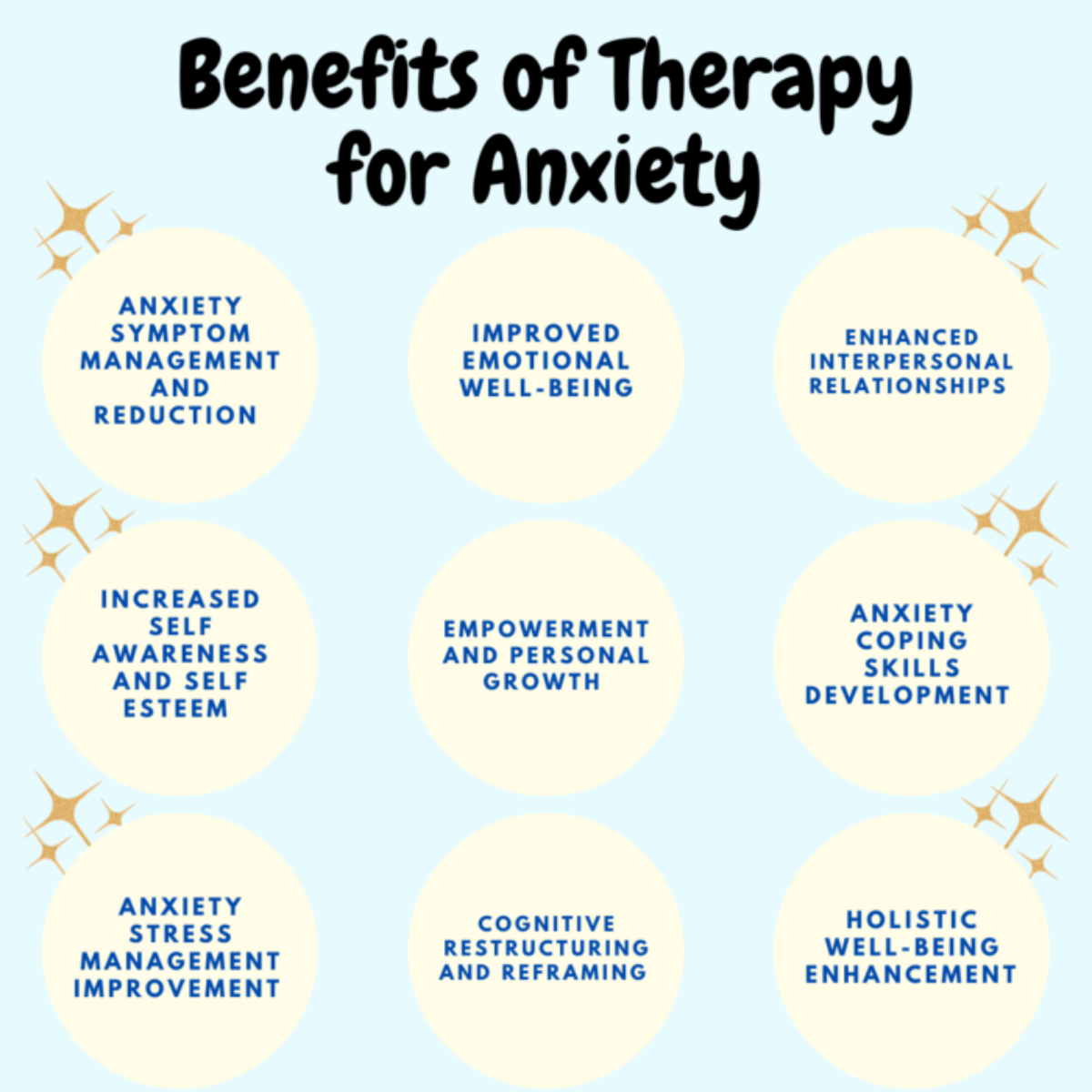Speak with a licensed therapist for anxiety and find peace of mind
Discovering Various Approaches in Counselling for Anxiousness Problem for Long Lasting Adjustment
When tackling stress and anxiety conditions, it's essential to explore a variety of counseling approaches. Each technique provides distinct insights and tools to help you manage your symptoms effectively. You might find that integrating methods can produce the ideal outcomes. Comprehending the subtleties of these techniques is crucial to fostering long-term modification. Suppose the right combination could launch a brand-new level of emotional health for you?
Comprehending Stress And Anxiety Disorders: A Quick Review
Stress and anxiety disorders, which affect millions of individuals worldwide, can significantly affect day-to-day live. You could experience frustrating feelings of worry or worry that appear unmanageable. These sensations can cause physical symptoms like an auto racing heart, sweating, or perhaps wooziness. Typical types of anxiousness conditions consist of generalized anxiousness problem, panic condition, and social anxiousness problem. Each has special indications, but they all share a propensity to disrupt your regular and relationships.Understanding the root triggers of your stress and anxiety is important. It could come from genes, mind chemistry, or life experiences. Acknowledging your triggers can aid you manage your feedbacks better. It's vital to keep in mind that you're not the only one in this battle. Numerous individuals face comparable obstacles, and seeking aid is a solid action toward feeling better. By finding out about anxiousness conditions, you're already on the course to understanding and handling your condition a lot more properly.
Cognitive-Behavioral Therapy: Challenging Unfavorable Idea Patterns
In Cognitive-Behavioral Treatment, you'll begin by identifying the negative thought activates that add to your anxiety. Once you acknowledge these ideas, you'll deal with changing them with more favorable alternatives. With each other, you'll build efficient coping methods to aid handle your anxiety in daily circumstances.
Determining Unfavorable Idea Triggers

Recognizing the specific triggers behind your adverse ideas can be necessary in handling stress and anxiety when you come across moments of distress. Start by paying attention to situations that provoke sensations of fear or anxiety. Is it a jampacked area, a forthcoming target date, or a discussion with specific individuals? Write these circumstances in a journal. This will certainly help you identify patterns in your thinking. Also, notice physical sensations that accompany your negative ideas, like a racing heart or rigidity in your breast. By determining these triggers, you acquire insight right into what's fueling your stress and anxiety. Understanding these links is the very first step in testing those thoughts and inevitably restoring control over your psychological actions.
Changing Thoughts With Positives
Challenging unfavorable thought patterns is a necessary action in transforming your frame of mind and lowering anxiety. You may commonly find yourself caught in cycles of insecurity or catastrophic thinking. Rather than letting these thoughts dictate your sensations, practice changing them with positive affirmations or sensible alternatives. For circumstances, when you think, "I can not manage this," shift it to, "I can handle obstacles one step each time." This simple modification can greatly influence your mood. Frequently determining and countering these unfavorable thoughts helps develop a healthier internal dialogue. Keep in mind, it takes time and initiative, but constantly practicing this strategy can cause enduring modification, equipping you to deal with anxiety with renewed self-confidence and strength.
Structure Coping Strategies Together
Changing unfavorable thoughts is only the start of taking care of anxiousness successfully. To produce long lasting adjustment, you need to construct coping techniques that empower you. Cognitive-Behavioral Treatment (CBT) aids you determine and challenge those purposeless idea patterns. Together, you and your therapist can check out how these ideas effect your feelings and behaviors.Start by developing useful strategies, like journaling or mindfulness workouts, that permit you to face anxiety head-on. When you encounter your anxieties slowly, you'll find out to respond in different ways.

Mindfulness and Acceptance-Based Approaches: Cultivating Present-Moment Recognition
As you navigate the intricacies of anxiety, including mindfulness and acceptance-based methods can substantially enhance your capability to grow present-moment understanding. By concentrating on the here and currently, you'll find that you can observe your ideas and sensations without judgment (Counseling services for anxiety). This method aids you acknowledge your anxiousness without really feeling overwhelmed by it.Engaging in mindfulness exercises, such as deep breathing, body scans, or assisted meditations, enables you to ground on your own in your existing experience. Acceptance-based strategies motivate you to accept your feelings as opposed to combat against them. When you approve your sensations, they shed their power over you.Incorporating these practices into your day-to-day routine can transform exactly how you react to anxiety. You'll create resilience and find out to navigate difficult situations with greater convenience. Eventually, growing present-moment understanding lays the foundation for lasting adjustment, empowering you to lead a more fulfilling life
Exposure Therapy: Confronting Fears Gradually
Exposure therapy assists you confront your concerns in a progressive means, making it less frustrating. You'll learn strategies to deal with anxiety-provoking circumstances detailed, while also developing coping techniques to handle your responses. This strategy encourages you to take control and reduce stress and anxiety over time.
Gradual Direct Exposure Techniques

When facing anxiousness, gradually facing your fears can be a powerful way to restore control. This technique, referred to as gradual direct exposure, involves gradually revealing yourself to the situations or objects that trigger your stress and anxiety. Begin with less daunting situations and progressively function your means as much as even more difficult ones. If you're worried of public speaking, you may begin by talking in front of a mirror, then advance to sharing ideas with a close friend, and ultimately resolve a small group. Each action aids desensitize you to the fear, developing your self-confidence over time. Keep in mind, it's important to pace on your own and commemorate small success as you relocate through this procedure, enhancing your ability to handle anxiousness effectively.
Building Coping Methods
Structure effective coping strategies is vital for taking care of anxiousness, especially as you face your concerns progressively - Counseling services for anxiety. One effective approach is direct exposure therapy, where you begin by encountering your concerns in a regulated way. Start with much less frightening scenarios and gradually function your method as much as even more challenging scenarios. This gradual exposure aids desensitize you to anxiousness causes, making them much less overwhelming.Incorporate leisure methods, such as deep breathing or mindfulness, to calm your mind during direct exposure. Track your progress, commemorating tiny success along the method to improve your confidence. Keep in mind, it's alright to take your time; the goal isn't excellence yet consistent enhancement. By building these strategies, you'll encourage on your own to navigate anxiety and accept life much more fully
Psychodynamic Treatment: Discovering Source of Stress And Anxiety
Psychodynamic therapy discovers the unconscious mind, revealing the origin of your anxiety. By analyzing your thoughts, sensations, and past experiences, this approach assists you uncover underlying problems and unsettled issues that might add to your current stress and anxiety. You'll work with a specialist to check out childhood years experiences, partnerships, and emotional patterns that form your actions today.As you gain understanding into these much deeper layers of your psyche, you'll start to identify exactly how previous events affect your present actions. This understanding can lead to catharsis, permitting you to process feelings you might have suppressed.Through the restorative partnership, you can likewise recognize defense systems that might have established with time, providing a more clear path to alter. Inevitably, psychodynamic therapy furnishes you with the devices to address your anxiousness at its core, promoting enduring change in your psychological wellness.
Alternative and integrative Approaches: Integrating Strategies for Greater Efficacy
Integrating numerous therapeutic strategies can enhance your journey towards managing stress and anxiety better. By combining aspects from cognitive-behavioral therapy, mindfulness practices, and alternative strategies, you can develop a customized method that resolves your one-of-a-kind demands. For instance, you might use cognitive-behavioral methods to challenge unfavorable idea patterns while including mindfulness workouts to ground on your own in the existing moment.Additionally, discovering all natural practices such as yoga exercise or reflection can advertise leisure and reduce anxiety symptoms. This blend allows you to create better self-awareness and resilience.Experimenting with these diverse methods can help you uncover what reverberates most with you. Keep in mind, it's regarding finding a harmony that functions, instead of sticking to a solitary strategy. This integrative approach not just provides immediate alleviation however also fosters long-term skills for managing anxiousness, equipping you to recover control over your life.
The Function of Support Solutions: Building Durability Through Link
While it may seem that managing anxiety is a solitary journey, having a solid support system can play a vital role in your strength. Surrounding on your own with empathetic friends, family members, or support teams creates a secure space where you can freely share your feelings and experiences. You advise on your own that you're not alone in this click here struggle.These connections offer support and can provide functional coping strategies that have worked for others when you attach with others. It's also an opportunity to gain viewpoint; buddies can aid you see situations in different ways, decreasing sensations of isolation.Moreover, psychological support cultivates a sense of belonging, which can substantially reduce stress and anxiety signs and symptoms. By leaning on your support system, you can develop durability and take on challenges much more successfully. Bear in mind, getting to out for help is an indication of stamina, and it can make all the distinction in your trip towards taking care of anxiety.
Frequently Asked Questions
What Are the Common Signs of Anxiousness Disorders?
You might experience restlessness, tiredness, trouble focusing, impatience, muscle tension, and sleep disruptions. Physical signs and symptoms can consist of quick heart beat, sweating, and shivering. Recognizing these signs early can assist you look for appropriate assistance and therapy.
For How Long Does Treatment Normally Last for Anxiousness Problems?
Treatment for anxiousness disorders generally lasts anywhere from a few weeks to several months. It actually relies on your private requirements, development, and the techniques your specialist uses to aid you manage your stress and anxiety properly.
Can Medicine Be Made Use Of Alongside Therapy for Anxiousness?
Yes, medication can definitely be used alongside treatment for anxiousness. Integrating both techniques commonly improves treatment effectiveness, helping you manage signs while checking out underlying problems via counseling (Counseling services for anxiety). Always consult your healthcare copyright for individualized suggestions
Exist Self-Help Methods for Handling Stress And Anxiety?
Yes, there are a number of self-help methods for handling anxiousness. You can exercise mindfulness, involve in regular workout, maintain a well balanced diet, establish a regular, and utilize deep breathing strategies to help lower stress and anxiety signs and symptoms successfully.
How Do I Know if I Required Professional Assistance for Anxiety?
